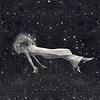Take a photo of a barcode or cover
This is going to be a personal/subject of you. Usually I try to keep my reviews fairly objective were also talking about what I like about the book. I’m gonna let it be personal because it really is based on my personal reading of her work and what I need at this point.
If you have not done any of her workbooks, this is a great read. It’s a lot of what she teaches in her other books like the Artist’s Way and Walking in this World and being a goal. She covers much of the same territory with many of the same kinds of stories of inspiration. If you are not sure about a commitment to one of the workbooks, then this would be a great introduction. If it has been decades since you’ve done Artist’s Way and you are too busy for another round, this is a GREAT choice.
Because I only did Vein of Gold (not my fave) a couple of years ago and have been slowly working through Walking through this World, it was too much of the same.
I understand how it got what it got, review wise. I applaud Julia and appreciate her telling the same stories, believing in the same thing (me the artist).
If you have not done any of her workbooks, this is a great read. It’s a lot of what she teaches in her other books like the Artist’s Way and Walking in this World and being a goal. She covers much of the same territory with many of the same kinds of stories of inspiration. If you are not sure about a commitment to one of the workbooks, then this would be a great introduction. If it has been decades since you’ve done Artist’s Way and you are too busy for another round, this is a GREAT choice.
Because I only did Vein of Gold (not my fave) a couple of years ago and have been slowly working through Walking through this World, it was too much of the same.
I understand how it got what it got, review wise. I applaud Julia and appreciate her telling the same stories, believing in the same thing (me the artist).
Gave my hardcover copy away to a cousin who was interested in writing. Bought a replacement paperback copy at Malaprop's a few years ago when passing through NC. Inspirational, motivational, practical.
informative
inspiring
slow-paced
I read this book because it was given to me by my mother years ago and I thought I should read it before I gave it to the thrift store. I had read The Artist’s Way and it didn’t speak to me so I was pretty positive this book would be no different. I was completely wrong. I. loved. this. book.
This book is the most beautiful and encouraging piece of art. Dare I say life-changing? It has been years since I left my writing job and now only write for myself. And since nobody is paying me to write I no longer think of myself as a writer, just someone with a frightening number of journals.
But writing has been such a crucial part of my life and growth. I wrote scores of pages when my brother died and when I lived an ocean away from my family. Writing is how I process and understand life. It means everything to me. And this book reminded me of that and encouraged me to keep going even if it’s no longer my job.
If writing has ever helped you or if you would like it to, I highly recommend this book.
This book is the most beautiful and encouraging piece of art. Dare I say life-changing? It has been years since I left my writing job and now only write for myself. And since nobody is paying me to write I no longer think of myself as a writer, just someone with a frightening number of journals.
But writing has been such a crucial part of my life and growth. I wrote scores of pages when my brother died and when I lived an ocean away from my family. Writing is how I process and understand life. It means everything to me. And this book reminded me of that and encouraged me to keep going even if it’s no longer my job.
If writing has ever helped you or if you would like it to, I highly recommend this book.
This book has been inspiring me to pick up writing every time I fall out of the habit ever since 2010.
So, this only took about 20 years to get to the end of. There is undoubtedly lots of really useful information and inspiration although some of the Californian woo-woo stuff was a bit much. Lots to take on board and I can't say that I followed it religiously (although it was written as though you should) but always good to expand my knowledge of using creativity creatively.
I found this book a great companion to building an early morning writing routine, full of creative inspiration. I read a few pages a day and looked forward to them each morning.
"Writing--and this is the big secret--wants to be written. Writing loves a writer the way God loves a true devotee. Writing will fill up your heart if you let it. It will fill your pages and help you fill your life."
In the midst of the huge learning curve that has been the publication of my first independent work, it was incredibly gratifying to be reminded of the reasons that I write -- not for publication or attention or fans (although those things are all lovely!) but because of the way it nourishes my soul. The Right to Write was recommended to me by a good writer friend when I posted a wishlist of books relating to Writing as a Spiritual Practice, and this was a really lovely start to reading through that pile.
I recently described Paulette Bates Alden's book, "Crossing the Moon," as "nourishing," and I can only use the same word to describe "The Right to Write." My writer's soul drank up Julia Cameron's encouragement and affirmation like South Dakota soil drinks up rain in its drout years. Each essay contained wonderful advice and beautiful reminders about the things we know, deep down, about our writing: that it matters to us, and even to the world, regardless of who sees it or how they react to it. I appreciated its focus squarely on writing as a process rather than a product, and its ability to separate the two without denigrating either one. In some places the essays felt a little meandering or even self-satisfied, and yet, this is a style that "works" for a book about letting writing flow to you and through you. And despite that, this book is not "rough" in any way -- one can see the creative whir beneath the finished product, and yet the finished product is still, indisputably, polished.
I haven't yet done any of the writing exercises ("initiations") at the end of each chapter, but I feel confident that sinking into them when I'm finished writing from "A Year in the Life" will give me an even deeper appreciation for this book.
I have never copied so many quotes out of a book before. "The Right to Write: An Invitation and Initiation Into the Writing Life" by Julia Cameron not only inspired me, but also calmed and centered me. Ms. Cameron ascribes to the belief that everyone is a writer, that everyone is creative and has the right to express that creativity. They should not be discouraged from doing something they enjoy. Writers aren’t this special elite group set up high on an ivory tower with their jealous muses, but just people who work every day to create something. She talks about overcoming writers’ block, depression, discouragement, and many of the other evils that plague those in the arts. But most of all, she urges you to never give up and write every day.
I don’t agree with everything in "The Right to Write." For example, while I do think anyone can write if they want to, that doesn’t mean they will write well or be publishable. You may have the right to write, but that doesn’t mean I want everything others written, no matter how poor, shoved in my face and expect nothing but praise. (I take the giving and receiving of constructive criticism very seriously.) I don’t think that everyone has the mind or imagination or drive of a writer.
I don’t agree with everything in "The Right to Write." For example, while I do think anyone can write if they want to, that doesn’t mean they will write well or be publishable. You may have the right to write, but that doesn’t mean I want everything others written, no matter how poor, shoved in my face and expect nothing but praise. (I take the giving and receiving of constructive criticism very seriously.) I don’t think that everyone has the mind or imagination or drive of a writer.
Julia Cameron's 'The Right to Write' is an excellent guidebook and motivational tool for writers. As in her 'Artist's Way' books, the premise is that creativity is a gift from spirit. I think for anyone who agrees with that philosophy, this book will resonate highly. Writing is compared to creating art - which I think is true.
For those of us who struggle to sit our asses down in the chair and actually write, instead of reading about, thinking about, and stressing about writing; it gives compelling arguments and exercises to overcome each blockage and hurdle you might encounter. Each chapter ends with an 'Initiation Tool' writing exercise to help clarify the concepts she offers in the chapters.
Topics range from - being in the mood to write, finding the time to write, sketches, morning pages, writing in odd locations, being an open channel, daily habits, etc.
Best quotes: "Writing brings clarity and passion to the act of living. Writing is sensual, experiential, grounding."
Those who diss the spiritual aspects of writing will probably not enjoy this book, but I surely did... a lot.
For those of us who struggle to sit our asses down in the chair and actually write, instead of reading about, thinking about, and stressing about writing; it gives compelling arguments and exercises to overcome each blockage and hurdle you might encounter. Each chapter ends with an 'Initiation Tool' writing exercise to help clarify the concepts she offers in the chapters.
Topics range from - being in the mood to write, finding the time to write, sketches, morning pages, writing in odd locations, being an open channel, daily habits, etc.
Best quotes: "Writing brings clarity and passion to the act of living. Writing is sensual, experiential, grounding."
Those who diss the spiritual aspects of writing will probably not enjoy this book, but I surely did... a lot.




